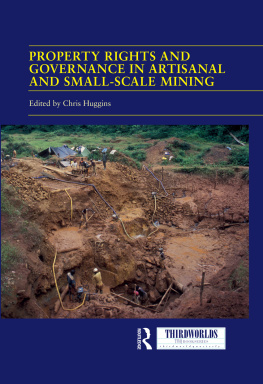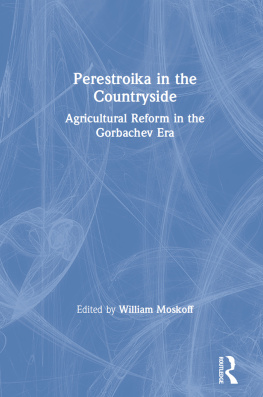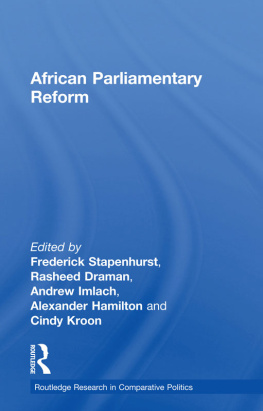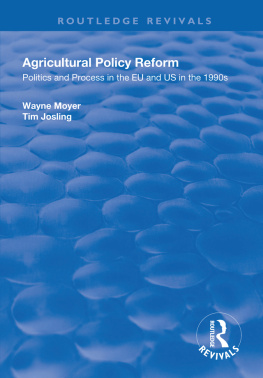
More praise for Agricultural Reform in Rwanda
A very informed, nuanced analysis of agriculture in Rwanda, spanning zones of governance, compliance and resistance in a developmental state. As always, only some citizens and communities benefit. This book shows us why.
Timothy M. Shaw, University of Massachusetts Boston
A well researched book on Rwanda, using an interesting blend of theoretical insights. It highlights the drama in Africa associated with capturing peasants for national development while at the same time avoiding elite capture of the public good.
Goran Hyden, University of Florida (Emeritus)
Drawing on his deep knowledge of Rwanda and extensive fieldwork, Huggins convincingly demonstrates that Rwandas agricultural development programs represent an extension of the states authoritarian control, and lead to popular resentment and resistance.
Timothy Longman, Director of the African Studies Center at Boston University
Theoretically sophisticated and rich in empirical detail. The book deserves a wide readership and can profitably be read by scholars and policy makers alike.
Rita Abrahamsen, University of Ottawa
In a nuanced and compelling account, Chris Huggins explores why Rwandas ambitious agricultural modernization program has undermined the livelihoods of many of the countrys smallholder farmers. It should be required reading for scholars and practitioners engaged with state-sponsored rural development in Africa.
Catharine Newbury, Smith College (Emeritus)
Politics and Development in Contemporary Africa
Published by one of the worlds leading publishers on African issues, Politics and Development in Contemporary Africa is an exciting new series that seeks to provide accessible but in-depth analysis of key contemporary issues affecting countries within the continent. Featuring a wealth of empirical material and case study detail, and focusing on a diverse range of subject matter from conflict to gender, development to the environment the series is a platform for scholars to present original and often provocative arguments.
Editorial board
Rita Abrahamsen (University of Ottawa); Morten Boas (Norwegian Institute of International Affairs); David Booth (Overseas Development Institute); Padraig Carmody (Trinity College Dublin); Neil Carrier (University of Oxford); Fantu Cheru (Leiden University); Kevin Dunn (Hobart and William Smith Colleges); Amanda Hammar (University of Copenhagen); Alcinda Honwana (Open University); Paul Jackson (University of Birmingham); Gabrielle Lynch (University of Warwick); Zachariah Mampilly (Vassar College); Henning Melber (Dag Hammarskjld Foundation); Garth A. Myers (Trinity College Hartford Connecticut); Lonce Ndikumana (UMass Amherst); Cyril Obi (Social Science Research Council); Susan Parnell (University of Cape Town); Mareike Schomerus (Overseas Development Institute); Laura Seay (Morehouse College); Howard Stein (University of Michigan); Mats Utas (Uppsala University); Alex de Waal (Tufts University)
Already published:
Mobility between Africa, Asia and Latin America: Economic Networks and Cultural Interactions , edited by Ute Rschenthaler and Alessandro Jedlowski
Forthcoming titles:
Liberias Female Veterans: War, Roles and Reintegration , Leena Vastapuu and Emmi Nieminen
Development Planning in South Africa: Policy Challenge in the Eastern Cape , John Reynolds
Food Aid in Sudan: A History of Power, Politics and Profit , Susanne Jaspars
Kakuma Refugee Camp: Humanitarian Urbanism in Kenyas Accidental City , Bram Jansen
Slum Africa: Life and Governance at the Margins in Accra , Paul Stacey
About the author
Chris Huggins is an assistant professor at the School of International Development and Global Studies, University of Ottawa, as well as being an adjunct professor at the Institute of African Studies, Carleton University, and a non-resident research fellow at the African Centre for Technology Studies (ACTS). He previously worked for Human Rights Watch as their Rwanda researcher, and as a consultant for numerous United Nations agencies, non-governmental organizations, and other development institutions. His previous books include Conflict and Housing, Land, and Property Rights (with Scott Leckie, 2011) and From the Ground Up: Land Rights, Conflict and Peace in Sub-Saharan Africa (co-edited with Jenny Clover, 2005).
Agricultural
Reform in Rwanda
Authoritarianism, Markets and Zones of Governance
Chris Huggins
Agricultural Reform in Rwanda: Authoritarianism, Markets and Zones of Governance was first published in 2017 by Zed Books Ltd, The Foundry, 17 Oval Way, London SE11 5RR, UK
www.zedbooks.net
Copyright Chris Huggins 2017
The right of Chris Huggins to be identified as the author of this work have been asserted by him in accordance with the Copyright, Designs and Patents Act, 1988
Typeset in Plantin by seagulls.net
Index:
Cover design: Keith Dodds
All rights reserved. No part of this publication may be reproduced, stored in a retrieval system or transmitted in any form or by any means, electronic, mechanical, photocopying or otherwise, without the prior permission of Zed Books Ltd.
A catalogue record for this book is available from the British Library
ISBN 978-1-78699-000-6 hb
ISBN 978-1-78699-002-0 pdf
ISBN 978-1-78699-123-2 epub
Contents
Research for this book was conducted with the permission of the Rwandan government, under research permits MINEDUC 802/ 12.00/2011, MINEDUC/S&T/0026/2011 and MINEDUC/S&T/ 0026/2013. is based in part upon a chapter entitled Climate Change Adaptation in Rwandas Agricultural Sector: A Case Study from Kirehe District, Eastern Province, in G. Ruchathi, W. Khaemba, and C. Ochieng, (eds), Defending the Voiceless: Listening to the Most Vulnerable During Climate Change Negotiations (African Centre of Technology Studies, 2017). I would like to thank the African Centre of Technology Studies for permission to reprint elements of that chapter.
I would like to thank the Rwandan Ministry of Educations Directorate of Science, Technology and Research for processing the research permit applications, as well as several local government officials and civil servants for their willingness to answer my questions. I would like to thank all of the participants in this research for generously sharing their time and perspectives. The research would not have been possible without the excellent and dedicated work of the research assistants, who must remain anonymous.
I would like to thank Professors Blair Rutherford, Simon Dalby, Marie-Eve Desrosiers and Rita Abrahamsen for their detailed attention to the arguments in the book, as well as several anonymous reviewers and the editorial team at Zed. Most of all I would like to thank my family, including Christine and Sudha for providing childcare and a place to work in peace, Siddhu and Safia for their flexibility and patience when their dad and mum were so busy, and especially Sheila for her daily moral, intellectual and logistical support, which allowed the text to be written.
This book is dedicated to all the people of Rwanda, particularly those in rural areas who work hard every day to navigate the risks and opportunities of the changing agricultural landscape; and to the memory of the late Alison Des Forges, a great academic and a wonderful human being.












